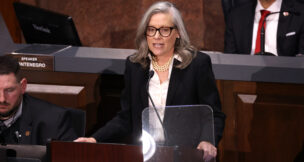IRS denies tax refund for 750,000 Arizona residents
Howard Fischer, Capitol Media Services//September 25, 2025//
IRS denies tax refund for 750,000 Arizona residents
Howard Fischer, Capitol Media Services//September 25, 2025//
Key Points:
-
IRS says 750,000 Arizonans not entitled to tax refund due to state lawmakers missing deadline
-
Arizona’s $230 million rebate had no relation to COVID-19 costs, DOJ attorney tells court
-
Arizona’s rebate program was not needs-based, excluding the poorest residents
The Internal Revenue Service says 750,000 Arizonans are not entitled to a refund of taxes paid on a state rebate if for no other reason than state lawmakers missed the deadline to approve it.
And if that’s not enough, Anthony Sheehan, an attorney from the Department of Justice, is telling the 9th Circuit Court of Appeals that the $230 million the state gave out in 2023 had no relation to helping Arizonans cope with the costs of Covid, the reason the IRS agreed to make payments made by 21 other states exempt from federal income tax.
Nor was it needs-based, he said, with no link between the amount of the rebates — up to $750 for a family — and whether they actually had paid that much in taxes.
In fact, he told the court, the reverse is true: As crafted, the most needy were ineligible.
“The payment criteria excluded the poorest residents while allowing payments to high-income residents,” Sheehan wrote.
And there’s something else.
He said even if $20.3 million paid by Arizonans on that $230 million in rebates never should have been collected — a point he is not conceding — the state is in no legal position to seek refunds of the excess taxes for the affected residents. Instead, even the state has conceded each would have to file an appeal.
So far, the IRS is winning, with a trial judge tossing out a lawsuit filed by Arizona Attorney General Kris Mayes. That now puts the case before the federal appellate judges.
They appear to be interested in listening to arguments from both sides and have scheduled a hearing for November.
At issue is the fact that 21 states enacted programs in 2022, during the Covid emergency, to provide special payments to residents. And he said that the IRS agreed that in all those cases, the cash received was not subject to federal taxes.
But Sheehan told judges from the 9th Circuit Court of Appeals that Arizona did not enact its own “Arizona families tax rebate” until May 11, 2023, the day the Covid public health emergency expired, something that had been announced three months earlier.
More to the point, he stated that the IRS determined the exemption from federal taxes applied only to payments made in 2022. Arizona’s payments of $260 million, however, went out in late 2023.
That, Sheehan said, makes those payments different than those in the 21 other states. And that, he told the court in his legal briefs, means the state had no choice but to issue a 1099-MISC form to each rebate recipient and report it to the IRS.
All this stems from a provision in the 2023 Arizona budget — when the state had a surplus — to provide a rebate to families of $250 for every child younger than 17 and $100 for older dependents, up to a maximum of $750 per family. That generated approximately $260 million for 750,000 Arizona families, with the average rebate being around $370.
What wasn’t known at the time lawmakers approved the measure was that the IRS would later tell the state Department of Revenue it considers the way Arizona made the payments subject to federal income taxes.
Sheenan, in his latest court filings, provided the appellate judges a litany of reasons to reject Mayes’ efforts to sue the IRS to get a refund for affected Arizona taxpayers. And it goes beyond lawmakers here not meeting the deadline — as did the other states — to enact the rebate.
For one, he told the judge, the whole purpose of exempting rebate dollars from federal income taxes was to help people deal with the effects of the pandemic.
But that, Sheehan said, wasn’t what was behind the Arizona plan. And he noted the legislation never once mentioned Covid or the IRS guidance about what would be tax exempt.
Instead, the legislation said that the purpose was related to the fact that “inflation is at a 40-year high, putting gas, groceries and other necessities out of reach for many Arizonans.”
“Responsible budget has allowed this state to take action to mitigate the harmful impacts of inflation by returning a portion of the surplus to this state’s taxpayers with dependents,” the law said.
There actually was a political element to the whole program — one that had absolutely nothing to do with Covid.
When enacting the budget in 2023, lawmakers found that they were sitting on a $2.4 billion surplus. That was the amount left over after the adoption of a funding plan for the upcoming fiscal year, which made required adjustments for inflation and program growth.
To line up the votes, budget negotiators agreed to give each lawmaker money to allocate — generally $30 million for senators and $20 million for representatives, with a separate allocation for the governor — from that surplus.
Lawmakers had the option of pooling their shares.
Democrats allocated some of their funds to a one-time $300 million funding boost for K-12 education. The $150 million deposited into the housing Trust Fund also came out of Democrats’ pooled dollars.
Sen. Jake Hoffman, chair of the legislative Freedom Caucus, sought to do the same for a tax rebate.
But he found only some fellow GOP lawmakers were going along. Others, however, chose to earmark their shares for projects ranging from traffic circles, pavement improvements, sidewalk construction and extending highways, leaving only $260 million allocated for the rebate.
Aside from the rebate not being related to Covid, Sheehan also pointed out this was hardly based on need. In fact, he said, the reverse was true.
On one hand, the rebates were paid strictly based on the number of dependents. And it didn’t even require showing that any family had actually paid that amount in state taxes.
“Because Arizona’s payments were not capped, they did not qualify as refunds,” Sheehan told the judge. As crafted, it even allowed a family that had paid as little as $1 in state income taxes to qualify for the maximum $750.
Conversely, Sheehan pointed out, only those who claimed at least one dependent on their 2021 state tax returns were eligible. So, no relief is available for individuals or couples without children.
Then there’s that requirement to have paid at least $1 of state income taxes on that return or in two earlier years to qualify for the rebate.
There are no numbers immediately available about who doesn’t pay taxes.
But state law exempts up to $14,600 income for single people and $29,200 for married couples filing jointly. Plus there are exemptions for things like Social Security benefits, active duty military and military retirement pay, and up to $2,500 for certain government pensions.
None of those who owed no taxes got any money.
Mayes is pursuing another legal theory in her lawsuit against the IRS.
She said if the IRS had not taken that $20.8 million from state residents, they would have spent it here. And Mayes said the state would have collected about $480,000 in sales tax.
Federal Judge G. Murray Snow dismissed any injury to the state as “derivative and speculative.” In fact, he said, even the state, in its lawsuit, admitted that the only certainty was that if Arizonans had retained the money they would have been free “to spend it as they saw fit.”
Sheehan told the appellate judges there was no basis for that $480,000 figure. And even if Arizonans had that much more to spend, he called it “speculative” to say the state would have benefited.
“They are free to use their money as they see fit, and not necessarily on items subject to Arizona sales tax,” he said.














































